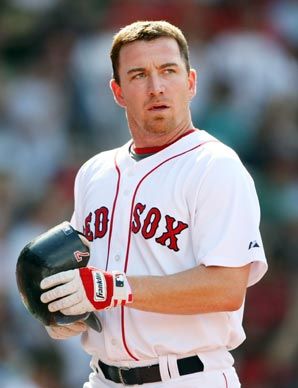 |
J.D. Drew attended Florida State University, where he was the 1997 Collegiate Baseball "Player of the Year", the "Sporting News Player of the Year", and a consensus All-American. He also was a 1996 member of Team USA and was the first player in college baseball to hit 30 home runs and steal 30 bases in the same season. He set a Florida State record by batting .455 in 1997 while becoming one of only three players in college baseball history to have 100 hits, 100 runs and 100 RBIs. During his college career, he broke 17 school and conference records. The Philadelphia Phillies made J.D. the second overall pick in the 1997 MLB draft. He didn't sign with them and ended up playing for the St. Paul Saints of the independent Northern League. After playing for St. Paul in the 1997 season, J.D. was selected in the first round of the 1998 MLB draft, by the St. Louis Cardinals. He hit .316 through 26 games with the Triple-A Memphis Redbirds and was called up by the Cardinals, making his debut in the game where teammate Mark McGwire broke Roger Maris' home run record. But J.D. struggled to stay healthy, landing on the disabled list during the four seasons he played in St. Louis. Manager Tony La Russa grew frustrated with his lack of passion and thought he was settling to play at 75%" of his talent. And so in December 2003, J.D. was traded to the Atlanta Braves. There, he had the best season of his career while finally managing to stay healthy and displayed excellent power, patience, and defense, hitting .305 with 31 home runs. The following season, he signed a five-year contract with the Dodgers, which included an escape clause after the second year. Roughly halfway through the 2005 season,his second year, J.D.'s season was again cut short after being hit on the wrist by a pitch. In September, he was part of a set of back-to-back-to-back-to-back home runs with fellow Dodgers Jeff Kent, Russell Martin, and Marlon Anderson. At the end of 2006, J.D. exercised his contract opt-out clause to become a free agent. He had told an LA Times how happy he was in LA and how he was looking forward to the upcoming season so it was a surprise to the Dodger front office. He had produced a very good season, batting .284 with 20 home runs and 100 RBI. In January 2007, J.D. officially signed a five-year contract with the Red Sox. That contract had a clause which allowed the Sox to opt out of his contract after three or four years, if his past injuries popped up, due to a previously existing problem in his right shoulder. He joined newcomer Julio Lugo as the two big free agent signings on the 2008 Sox roster. J.D. was again part of a set of four consecutive home runs in April, this time joining with Manny Ramírez, Mike Lowell, and Jason Varitek. He became the only player to participate twice in a string of four straight home runs. He finished the season with a .270 batting average, 11 home runs, 64 RBIs and celebrated a Red Sox trip to the post-season that culminated in their second World Series ring in three years.is highlight came when he hit a grand slam in Game #6 of the ALCS with the Sox facing elimination. In May 2008, he and Mike Lowell hit grandslam homers in same game. He was then named the AL "Player of the Month" for June after hitting .337 and hitting 7 home runs in 11 games. He then became an AL All-Star reserve. It was his first All-Star game appearance and he hit a tying two-run home run in the seventh, singled, stole a base, and walked in the game winning rally. He was named the "Most Valuable Player". But he later visited the 15-day disabled list, spending from August to the beginning of September with a strained lower back. In Game #2 of the 2008 ALDS against the Angels, J.D. hit a go-ahead two-run home run in the ninth inning. In Game #5 of the ALCS against the Tampa Bay, he helped to bring the Red Sox back from a late-inning seven-run deficit, with a two-run home run in the eighth inning, and then delivered the walk-off hit in the ninth. That comeback, was the second-biggest in postseason history and the largest for a team on the brink of elimination. However, the Red Sox lost to the Rays in the final game. After the 2009 season, J.D.'s statistics began to decline. That year, he hit .279, the following year hit .255 and in 2011, he hit only .222 with four home runs in only 81 games, deciding to retire at the end of the season. |
|||
